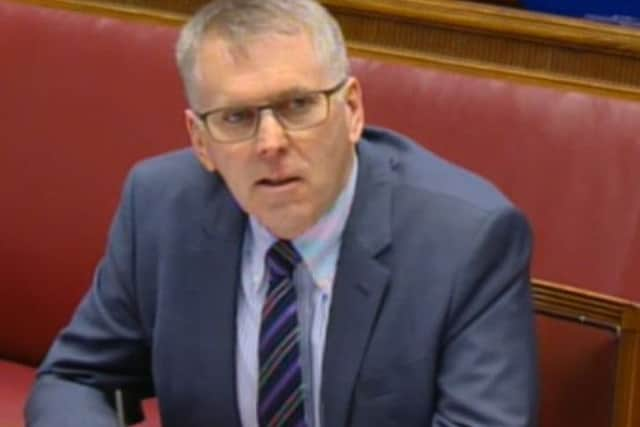RHI inquiry: we should have warned Foster over scheme, says top civil servant
and live on Freeview channel 276
In evidence to Sir Patrick Coghlin’s public inquiry into the ‘cash for ash’ scandal, David Sterling accepted that, with hindsight, senior civil servants should have said to the then energy minister that they simply did not have the staffing resources to set up the scheme, even though that would mean missing out on millions of pounds of money from the Treasury.
Mr Sterling, who was last year promoted to become the head of the Northern Ireland Civil Service, was the most senior official in the DUP minister’s department at the time when the green energy incentive was set up in 2012.
Advertisement
Hide AdAdvertisement
Hide AdOn Tuesday there was no clarification of, or expansion on, Mr Sterling’s comments last week to the inquiry about a “habit” of not minuting many ministerial meetings due to what he said was an attempt to thwart potential Freedom of Information requests as a result of the sensitivity of DUP and Sinn Fein ministers to criticism.


He did, however, speak in detail about the tiny handful of civil servants – with one, who had no background in energy policy, doing the lion’s share of the work – who were asked to set up and oversee a complex and novel scheme involving financial commitments which exposed taxpayers’ money over a period which extended 20 years into the future.
Mr Sterling stressed that “no one was telling me it would be reckless to proceed with this level of staffing” but conceded that he should have been “more inquisitive” about aspects of the scheme
He said: “To proceed on this project with such limited resource, we should have recognised – I should have recognised – at the time that this was probably an unnecessary risk. I would accept that now.”
Advertisement
Hide AdAdvertisement
Hide AdWhen asked if there was anyone else who should have recognised that at the time, Mr Sterling said: “Well, I think there’s clearly a responsibility on myself, David Thompson and Fiona Hepper at the time. And again, it’s knowing what we know now. It would have been better if we had come together and said: Look, I’m not sure that we can guarantee that we can guarantee to deliver this in a safe and secure way and that perhaps this is one that we need to go to the minister and say ‘not just now’.


“Now there would have been resistance to that – understandable resistance, for reasons which I’ve articulated before – and I’m not sure that even if we had made that case that it would have been accepted. But again, that’s the way I feel now.”
Mr Sterling’s reference to the reasons for what might have been resistance from Mrs Foster may relate to comments which he made to the inquiry last week when he set out details of a culture within both the civil service and devolved ministers that Northern Ireland should seek to secure as much funding as possible from the Treasury as it would benefit the economy.
Last week he said that an accounting officer was required to treat the spending of public money with the same diligence – regardless of whether it was coming directly from the Treasury, or from Stormont’s block grant. However, he added: “If there’s an opportunity to draw down money which will give an economic benefit in Northern Ireland, the realpolitik here is that we draw down the maximum amount that we can because we will get an economic impact from that.”
Advertisement
Hide AdAdvertisement
Hide AdOn Tuesday he said that in 2013 “there was a perception of a low uptake” and that the emphasis was on increasing uptake, although now “when you analyse the figures the uptake was probably stronger than we appreciated”.
As a result of the level of uptake at the start, he said that there had been “a surrendering of the [Treasury-funded] budget that had been made available”.